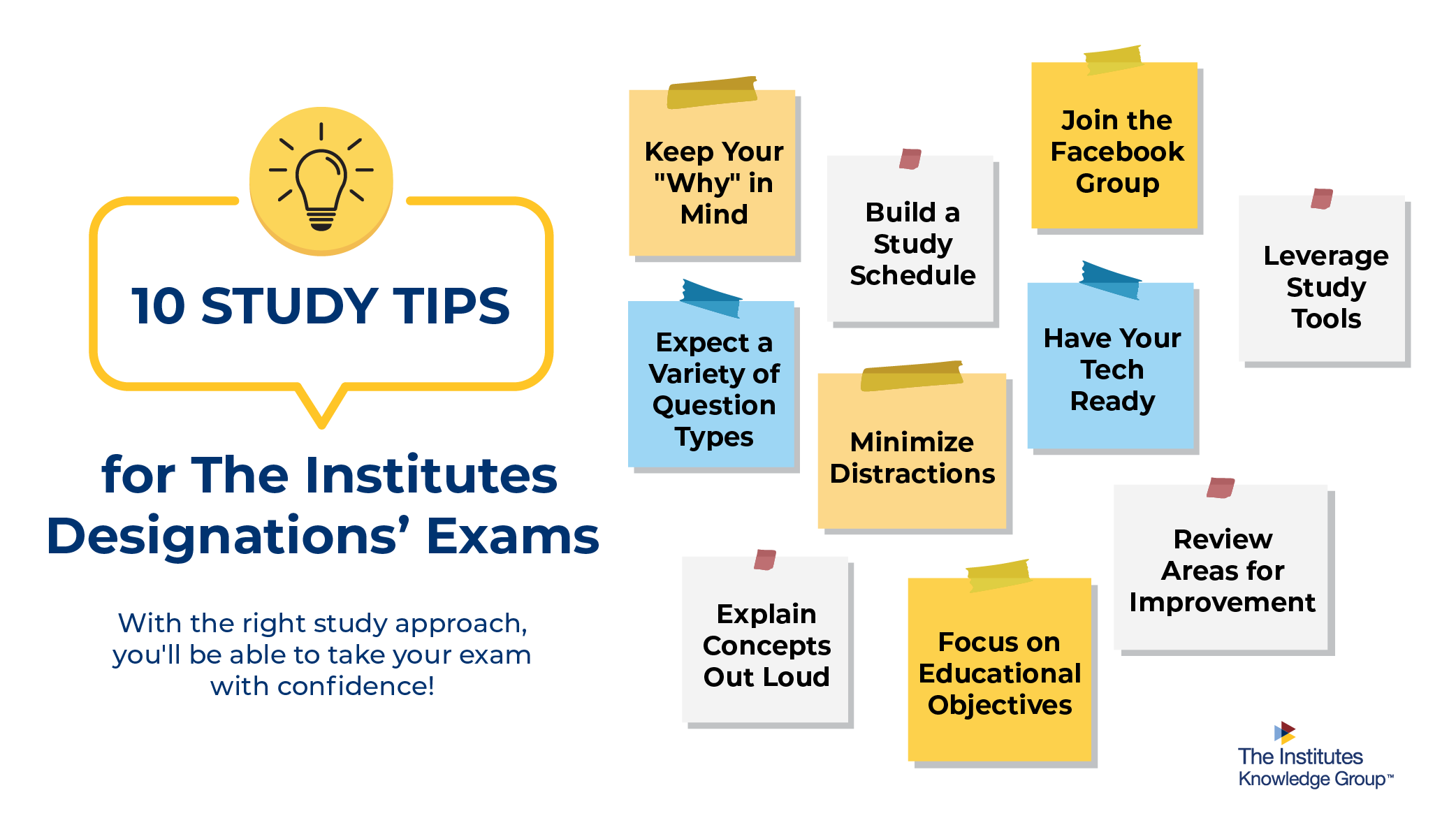Professional Development
What Are the Best Study Tips for The Institutes Designations’ Exams?
Are you planning to take an Institutes Designations’ exam soon? It’s natural to be a little nervous, but with the right strategies, you can feel confident and ready to succeed. Below, we’ve outlined 10 practical study tips to help you stay motivated, retain information, and apply what you’ve learned on exam day.
Important: These exams aren’t about memorization. They're designed to assess how well you apply knowledge in real-world scenarios.

Stay Motivated by Keeping Your “Why” in Mind
Use visual reminders—like Post-it notes or screensavers—to keep your goals front and center. Whether you're aiming for career advancement, personal growth, or improved job performance, connecting your study efforts to your larger purpose can help keep you on track. Share your goals with friends or family so they can support you.
You’re part of a field that helps people overcome life’s unexpected challenges. That purpose alone is a powerful motivator.
Build a Realistic Study Schedule
Research shows cramming at the last minute doesn’t support long-term retention—and it works against how Institutes Designations’ exams are structured. These exams assess applied knowledge.
Create a study schedule with clear milestones and SMART goals (specific, measurable, achievable, relevant, and time-bound). Use the printable study outline in each course, which includes key points, review questions, and space for notes. You can also track your progress and quiz results within your course to see where you stand.
Minimize Distractions
Find a quiet space, put your phone on do-not-disturb, and let family or friends know to respect your study time without distractions. Grab anything you might need—not just a pen and notebook—but also things like a full water bottle and a nutritious snack so you don’t have to get up and then try to settle back into study mode.
Beth Illian, a working parent who earned her CPCU®, AINS®, and AIS™ shared her routine to accomplish this. She would always study in the evening, after her kids were in bed, with a cup of tea and a stack of pretzels at the dining room table. This was a “signal to her brain” that this was the time to switch off from the day and study.
Focus on the Educational Objectives
Mike Bronzino, Managing Director of Exam Integrity for The Institutes, earned his CPCU®, ARM™, AIM™, ARe™, and AMIM® designations prior to joining The Institutes. That's more than 25 Institutes Designations’ exams completed, and he highly recommends you focus your study efforts on the educational objectives. These are the central themes of the course material. Exam questions directly relate to the real-world application of these course objectives. If you focus only on facts or terminology, you’ll miss the bigger picture.
Leverage the Study Tools in Your Course Materials
All designations courses include proven, comprehensive study materials to help you take the exam with confidence. In addition to the printable study outline with key points and review questions, you also have access to the following:
- Practice quizzes: Take them before and after each assignment to check your understanding. Aim for a score of 90% or higher before moving on.
- Flashcards: Test yourself on key terms with printable flashcards that help you fit studying into your busy schedule.
- Simulated exam: This is the most important exam prep tool. It mirrors the actual exam’s format, timing, and question style so you know exactly what to expect on exam day. You can only take the simulated exam once, so be strategic. Use it after you’ve completed the course and reviewed key concepts with the other exam prep tools. Students who take the simulated exam perform better than those who don’t.*
NEW: CPCU, AIC, AINS, ARM, AU, ARe, and AIDA course options now include hundreds of interactive exam practice questions that pull directly from the course content. With CPCU and AIC courses, you can also choose a package with an AI Assignment Assistant that adapts to your preferred learning style.
Expect a Variety of Question Types
Your exam will include multiple different question formats. Understanding these formats will help you feel confident and prepared.
In addition to multiple choice, your exam may include fill-in-the-blank, drag-and-drop, and numeric-entry questions. These are designed to help you better understand, retain, and apply course content while preparing you for real-world scenarios.
Join The Institutes’ Chat on Facebook
The Institutes' Chat on Facebook is The Institutes Knowledge Group’s office page and the place to connect with other students. Find a study partner, share tips, and celebrate milestones together. It’s easier to stay accountable and motivated when you're part of a community.
You’ll also see questions from other learners that can spark new ways of thinking and deepen your understanding, especially when you're tackling tough concepts.
Explain Concepts Out Loud
One of the best ways to reinforce your learning is to explain key concepts to someone else, as if you're teaching them. This practice, also known as the protégé effect or the Feynman Technique, helps you identify gaps in your understanding and deepens retention by forcing you to put the ideas into your own words.
Even if you don’t have a study partner, you can do this by speaking out loud to yourself or writing out an explanation in a notebook. The goal isn’t perfection; it’s about practicing how you apply the concepts, which is exactly what the exam will ask you to do.
Review Areas for Improvement
As you get closer to exam day, take time to focus on the areas that challenged you the most. Use your quiz results and course progress indicators to identify areas for improvement. But don't just reread the material. Focus on applying the concepts to real-life scenarios—just like you'll do on the exam.
Have Your Tech Ready
All exams now include virtual proctoring to maintain the value and integrity of your hard-earned Institutes Designation. You still have the same flexibility of testing anywhere, anytime, now with added security. Just ensure you're familiar with the requirements and have a reliable internet connection to complete your exam without interruption.
We recommend you test your equipment at least 48 hours before your exam.
Bonus Tips
- Chew gum: Some studies suggest chewing gum increases alertness and work performance, potentially helping you study and take the exam.
- Exercise beforehand: Research also suggests that exercising before studying can help you learn the material. Even 2 minutes can make a difference!
- Listen to the right music: Listening to music can help improve your studying and memory, but make sure you choose the right genre. Slow, lyric-free music can improve focus.
You’ve Got This
With the right tools, a clear plan, and consistent prep, you’re not just studying for an exam—you’re building your future in risk management and insurance. These exams are designed to evaluate how well you apply knowledge, not memorize facts. Every question is an opportunity to demonstrate your understanding and your growth.
Need more support? Visit our Exam Prep Center for more tips and answers to common questions.
* Based on analysis of CPCU®, AINS®, and ARM™ student exam results versus exam-preparation methodologies, 2020-2021.

About the Author
Angela Pilotti, CPCU, ARe, is Head of Education at The Institutes, where she leads the development of innovative learning resources and assessments for risk and insurance professionals. With leadership experience spanning reinsurance, underwriting, and content development, she brings deep expertise to risk and insurance education. .
